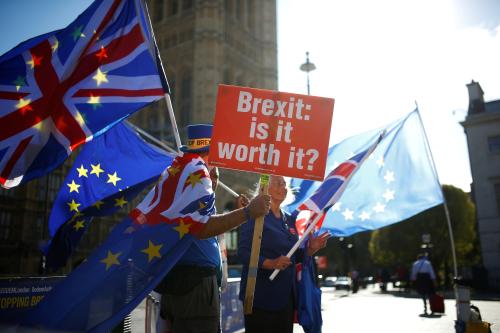British politics have come under the spotlight (again) in the wake of Brexit, Prime Minister Theresa May’s resignation, and the upcoming Conservative Party leadership election. A key player that is expected to influence the future of British politics is the Labour Party, which has been led by Jeremy Corbyn since September 2015.
On June 14, Brookings’s Center on the United States and Europe (CUSE) hosted historian and journalist David Kogan, who recently published “Protest and Power: The Battle for the Labour Party” (Bloomsbury, 2019), a history of the party from the 1970s to the present. Kogan discussed some of the central themes of his book, which asks whether Labour is a party of protest or one of power. He delved into the factors behind the party’s recent shift to the left and how this shift will affect the party’s electoral prospects. He noted that although Corbyn is a Eurosceptic, his party’s divide on Brexit has kept him from taking a definitive stance on the issue. Furthermore, Kogan posited that Labour will eventually have to address the backlash regarding Corbyn’s anti-Semitic remarks. Broadly, he suggested that Labour’s future success depends heavily on its leadership and how adequately it addresses the divides within the party.
Kogan’s talk was followed by a panel discussion featuring him and Amanda Sloat, Robert Bosch Senior Fellow at CUSE, and moderated by CUSE Director Thomas Wright. The panelists examined Tony Blair’s impact on Labour and the subsequent emergence of New Labour and Corbyn. They emphasized that Labour has been performing poorly in its transitional strongholds (such as Scotland), which has led to questions about Corbyn’s leadership capabilities. Moreover, they discussed how Corbyn stacks up against potential Tory challengers, who might replace Corbyn in the future, and what might the American Democratic Party learn from Labour’s left turn.
The panel then took questions from the audience.
Brookings Intern Naz Gocek contributed to this post.
The Brookings Institution is committed to quality, independence, and impact.
We are supported by a diverse array of funders. In line with our values and policies, each Brookings publication represents the sole views of its author(s).






Commentary
The history and future of Britain’s Labour Party
An expert discussion
July 8, 2019